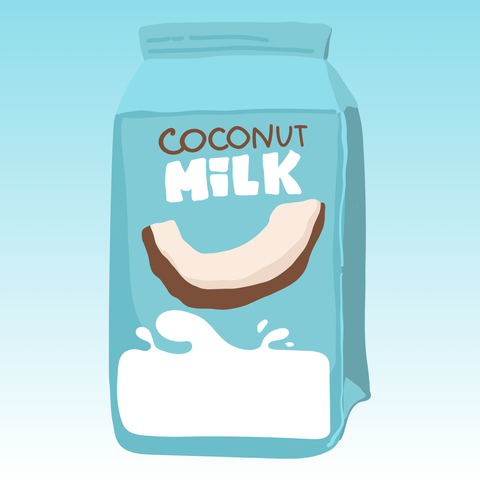
Types of Vegan Milk: Simplify the Switch!
What Is Vegan Milk?
Vegan milk is a plant-based alternative to dairy milk. It is made from ingredients such as soy, almonds, rice, oats, hemp, or coconut. Unlike cow’s milk, it contains no cholesterol and is typically lower in fat. Vegan milk is also free from lactose, suitable for those who are lactose intolerant.
Nutritionally, vegan milk often matches cow’s milk in several aspects, except for calcium and vitamin D, which can be found in fortified versions or other foods. While it usually has less protein than dairy, it still provides essential amino acids, making it a good option for plant-based diets.
Different Types of Milk
Each type of plant-based milk has its own flavor and texture, making some better suited for certain recipes than others. Here are the most common options:
- Soy Milk: Known for its similarity to dairy milk in protein content, soy milk is flexible and works well in cooking, baking, and beverages.
- Almond Milk: A light milk with a nutty flavor, almond milk is widely used in smoothies, cereals, and desserts.
- Oat Milk: Creamy and naturally sweet, oat milk is high in fiber and great for lattes, soups, and baking.
- Coconut Milk: With a rich and tropical flavor, coconut milk is ideal for curries, soups, and desserts.
- Rice Milk: Thin and sweet, rice milk is a safe option for those with food allergies, though it’s lower in nutrients than other options.
- Cashew Milk: Creamy and mild, cashew milk is great for teas, coffees, and recipes needing a smooth texture.
- Hemp Milk: Rich in omega-3 fatty acids, hemp milk has a thicker texture and works well in savory dishes.
- Hazelnut Milk: Naturally sweet with a nutty flavor, hazelnut milk is excellent for cereals and desserts.
Sip, Stir, Bake: Find Your Perfect Plant Milk
Baking
Soy milk is the top choice for baking due to its protein content, which helps maintain the structure of baked goods. Almond and oat milk are also good alternatives but may slightly alter the flavor or texture.
Coffee
The high acidity and heat of coffee can cause some plant-based milks to curdle. Oat milk and soy milk are the best options for coffee, as they are less likely to separate.
Tea
For tea, choose a plant-based milk with a mild flavor to avoid overpower the tea itself. Oat milk is a great choice due to its neutral taste and smooth texture. Cashew milk is another good option.
Cereal and Granola
Soy milk and hazelnut milk are excellent for cereals and granola due to their balanced texture and pleasant taste. These milks don’t require added sweeteners to complement breakfast dishes.
Cream Sauces
Coconut milk, with its rich texture and high fat content, is perfect for cream sauces, soups, and purees. It holds up well to heat and enhances the flavor of savory dishes.
Why this Milk is a Game-Changer
Plant-based milk offers several advantages over dairy milk:
-
Lactose-Free
Many people are lactose intolerant or experience digestive discomfort with dairy. Vegan milk offers a gentle, lactose-free alternative. -
Rich in Nutrients
Fortified plant-based milks often contain essential vitamins like B12, calcium, and vitamin D. Options like soy and hemp milk also pack a protein punch. -
Lower in Calories
Most vegan milks, especially almond and oat varieties, are lower in calories and fat compared to whole dairy milk. -
Environmentally Friendly
Producing vegan milk typically requires less water and generates fewer greenhouse gas emissions than dairy farming, making it a sustainable choice. -
Diverse Flavors
With options ranging from nutty to creamy and sweet, there’s a vegan milk for every palate and culinary need.
Vegan Dairy Alternatives
Plant-based options have become widely available, offering replacements for common dairy products. These include:
- Cheese: Made from cashews, almonds, soy, or pea protein.
- Milk: Options include soy, oat, almond, rice, hemp, and cashew milk.
- Butter: Produced from oils, nuts, or plant proteins.
- Ice Cream: Crafted with bases like soy, oat, or coconut milk.
- Cream Cheese and Sour Cream: Often made from cashews or beans.
The move toward plant-based milk isn't just a trend—it is a sustainable lifestyle choice. Studies reveal that the use of plant-based alternatives instead of dairy can reduce your carbon footprint by up to 73%, significantly aiding global efforts to combat climate change. Farmers and scientists also work to make these drinks even more eco-friendly by using fewer resources.
Plant-based milk has become a staple worldwide, with consistent market growth of 27% between 2020 and 2022, reflecting a shift in consumer priorities. Its wide availability makes it easy to include in coffee, cereal, or smoothies, and new options like pea and barley milk cater to those with allergies or specific preferences.
Fortified versions provide important nutrients like calcium and vitamin D, meeting the needs of all age groups. Opting for plant-based milk supports a healthier lifestyle and a kinder, more sustainable future. But perhaps the bigger question remains—do we need milk at all, vegan or otherwise?
Nutri Intact brings you the best of nature with our rich and exotic selection of nuts, spices, edible oils, and more. We preserve nature's goodness so you can enjoy wholesome food in your everyday meals. The best way to appreciate our quality is to try it for yourself. Enjoy the earthy aroma while cooking, feel the improvements in your gut health, and experience the balance that true soul food provides.
We are proud to be an FSSAI-licensed brand (Lic. No: 11224333002597).




